|
|
|
Sort Order |
|
|
|
Items / Page
|
|
|
|
|
|
|
| Srl | Item |
| 1 |
ID:
145976


|
|
|
|
|
| Summary/Abstract |
Failure and denial are seductive concepts, and they were explicitly theorised at the Millennium conference in October, 2015. Though used to evoke an array of images to understand the condition of International Relations (IR) as a discipline and in relation to other social sciences, the concepts were not previously deemed pivotal for theorising world events. This article critically assesses how failure and denial are used by IR’s scholarly community as signifiers, and what it is that they signify. To this end, it considers Bruno Latour’s keynote address at the 2015 Millennium conference, along with some of Latour’s shorter works. Drawing on STS (science and technology studies), postcolonial and queer sensibilities, it concludes with a discussion of the significance of theatre in IR scholarship, and examines the broader social and political implications of how we think and understand failure and denial in the era of the Anthropocene.
|
|
|
|
|
|
|
|
|
|
|
|
|
|
|
|
| 2 |
ID:
188164
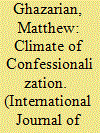

|
|
|
|
|
| Summary/Abstract |
After the 1877–78 Russo-Ottoman War, the Ottoman Empire saw the rise of ethnic and sectarian clashes in Anatolia, the Balkans, and elsewhere, and the task of explaining that rise remains unfinished. Many have examined the intellectual formations of ethnic and sectarian solidarities after 1878, but the availability of new ideas cannot alone account for their widespread uptake. Why after 1878 did ordinary people respond more to calls upon ethnic and sectarian solidarity? Drawing on sources surrounding the 1879 famine in the Ottoman East, this article steps away from imperial metropoles to examine overlapping environmental, financial, and technological disjunctures. Adopting the methods of political ecology, the article underscores the simultaneous effects of drought, sovereign default, and an influx of modern weapons, each of which imposed uneven hardships along ethno-religious lines. Together, they created a climate of lived confessionalization that highlighted the communal categories upon which emergent movements called.
|
|
|
|
|
|
|
|
|
|
|
|
|
|
|
|
| 3 |
ID:
095453
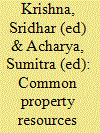

|
|
|
|
|
| Publication |
Hyderabad, ICFAI University Press, 2008.
|
| Description |
x, 247p.
|
| Standard Number |
9788131420263
|
|
|
|
|
|
|
|
|
|
|
|
Copies: C:1/I:0,R:0,Q:0
Circulation
| Accession# | Call# | Current Location | Status | Policy | Location |
| 054886 | 338.5/KRI 054886 | Main | On Shelf | General | |
|
|
|
|
| 4 |
ID:
164430


|
|
|
|
|
| Summary/Abstract |
Madagascar, Mauritius and Seychelles are at the center of industrial tuna extraction in the Southwest Indian Ocean (SWIO). In this paper, we show that, while a discourse of regionalism between the three islands is prominent, the possibilities of regionalism face deep challenges in relation to the tuna industry. This is due to three factors. First, local perceptions, especially amongst those working in and on the tuna industry, are in disconnection with an ‘Indianoceania’ vision. Second, the geopolitics between coastal states and distant water fishing nations creates various entanglements including through fishing access revenue and foreign aid. Finally, the materiality of tuna can at times create competition as countries seek to individually maximize benefits from the industry. We argue that the active reinforcement of regional identity and collaboration around this resource is necessary to sustain local benefits into the future.
|
|
|
|
|
|
|
|
|
|
|
|
|
|
|
|
| 5 |
ID:
144271
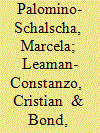

|
|
|
|
|
| Summary/Abstract |
The way that water is entangled with broader social relations has become a prominent concern in political ecology, geography and beyond. Employing the concept of the hydro-social cycle highlights how water is produced by, and simultaneously constitutes, social and power relations. Applying and expanding the hydro-social cycle as an analytical lens, this paper explores the contestation of different discourses of water. Looking at the conflict over the construction of a proposed dam in Chile, we examine different meanings given to water to understand how these produce uneven power relations with material and symbolic implications. By teasing out the workings and contestations of this conflict as a hydro-social cycle, we aim to highlight the diverse range of elements enlisted in it beyond water, to expose its complexity and to search for more just and inclusive alternatives.
|
|
|
|
|
|
|
|
|
|
|
|
|
|
|
|
| 6 |
ID:
155762


|
|
|
|
|
| Summary/Abstract |
This paper examines the Endosulphan pesticide disaster in Kasargod, Kerala, India. The paper argues that the pesticide disaster was the culmination of an agrarian modernization project implemented in the region by the state-owned Plantation Corporation of Kerala (PCK). An exploration of the political ecology of the disaster shows the recolonization of residents and nature by PCK through neocolonial forms of centralized and exclusionary spatial and resource control mechanisms. In this context, the paper questions the glorification of the “Kerala model” of development from the standpoints of environmental justice and resource rights, relying on the lived experiences of the people of Kasargod.
|
|
|
|
|
|
|
|
|
|
|
|
|
|
|
|
| 7 |
ID:
187016


|
|
|
|
|
| Summary/Abstract |
Much scholarly attention has been paid to the issue of climate change in the Pacific Islands, in terms of its geopolitical implications, and through the lens of mitigation and adaptation policies and strategies. Comparatively little focus has been given to the domestic politics of climate change in the region: How a changing climate is affecting internal political dynamics. This article traces the boundaries of a new research agenda on the impacts of climate change within Pacific states as an animating political dynamic. It considers climate change as a possible source of political change and contestation; as a critical domestic policy issue; and as a driver of political participation and organisation. Climate change is an existential threat to the Pacific Islands, yet it has unique power as a mass mobilising factor in the largely localised and fragmented politics of the region. We conclude with some reflections on the potential of climate change as a key political driver in the region, and fruitful avenues for future research.
|
|
|
|
|
|
|
|
|
|
|
|
|
|
|
|
| 8 |
ID:
188858
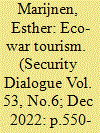

|
|
|
|
|
| Summary/Abstract |
This article introduces ‘eco-war tourism’, a growing niche in which tourists venture into war zones to seek adventure and ‘save’ nature from its violent surroundings. In Virunga National Park in eastern Democratic Republic of Congo, such tourists can experience the ‘threat of mortality’ while visiting mountain gorillas, contribute to the survival of the park and supposedly participate in regional peacebuilding. This article considers how the amalgamated commodification of war and gorillas leads to the bunkerization of tourism, the reconfiguration of space into ‘safe’ and ‘dangerous’ areas and the militarization of conservation. It links critical security studies and political ecology to theorize how eco-war tourism intensifies green militarization and how militarized conservation itself becomes a spectacularized tourist attraction. Eco-war tourism is informed by, and productive of, various affective geographies, entrenched in colonial durabilities that produce Eurocentric ideas about how and by whom nature should be protected. I call for critical security studies to examine how diverse security interventions – e.g. military, tourism, humanitarianism and conservation – are entangled in and reconfigure inherently political nature–society relations and underscore the futility of approaching ‘society’ and ‘the environment’ as separate fields of security.
|
|
|
|
|
|
|
|
|
|
|
|
|
|
|
|
| 9 |
ID:
081760


|
|
|
|
|
| Publication |
London, Routledge, 2007.
|
| Description |
v1(xxviii, 470p.); v2(xi, 471p.); v3(ix, 479p.); v4(xi, 558p.)
|
| Standard Number |
97804154362610
|
|
|
|
|
|
|
|
|
|
|
|
Copies: C:4/I:0,R:4,Q:0
Circulation
| Accession# | Call# | Current Location | Status | Policy | Location |
| 053441 | 333.72/ROB 053441 | Main | On Shelf | Reference books | |
| 053442 | 333.72/ROB 053442 | Main | On Shelf | Reference books | |
| 053443 | 333.72/ROB 053443 | Main | On Shelf | Reference books | |
| 053444 | 333.72/ROB 053444 | Main | On Shelf | Reference books | |
|
|
|
|
| 10 |
ID:
171916


|
|
|
|
|
| Summary/Abstract |
This paper investigates the adaptation processes with reference to the narrative analysis of human–environment interactions in the Vietnamese Mekong Delta. From the political ecology perspective, it focuses on the discourses of the power relationships embedded within the ‘state‐society‐flood’ nexus over the course of its ‘opening‐up and closing‐off’ processes (e.g. excavating large‐scale canals for human settlements and agricultural expansion (opening‐up) and human interventions into natural systems through water control structures (closing‐off)). Drawing on empirical data gathered from 33 interviews and nine focus group discussions in three study areas and relevant literature, the paper argues that human interactions with the flood environments are intertwined with adjustments of adaptation patterns as evidenced through three periods: free adaptation (pre‐1975), transitional adaptation (1976–2010) and forced adaptation (after 2010). These processes have witnessed a gradual power shift in the ‘state‐society’ relations in manipulating floods, which moves from the top‐down towards a more collaborative fashion. By unravelling the political ecology of the ‘state‐society‐flood’ nexus, this paper exhibits the skewed development in the delta, which is largely bound to short‐term development planning to prioritise local socio‐economic and political objectives. The paper contributes important policy implications for achieving socially just and environmentally sustainable development in the delta.
|
|
|
|
|
|
|
|
|
|
|
|
|
|
|
|
| 11 |
ID:
133116


|
|
|
|
|
| Publication |
2014.
|
| Summary/Abstract |
This paper draws from research on small-scale maize production in Mexico's Central Highland region to discuss the geopolitical implications of everyday agricultural practices. An overwhelming majority of maize farmers in this region, as well as in the country more broadly, continue to cultivate locally adapted maize varieties they have bred themselves - criollo maize is the vernacular term - despite decades of concerted government attempts to effect the widespread adoption of commercially bred and licensed hybrid varieties. This state effort to restructure agricultural systems and food security according to nationalist and capitalist priorities is one tactic in a long and violent struggle for control over peasant land and labour in Mexico. By integrating feminist scholarship in geopolitics and in political ecology, I am following the lead of geographers who regard the materialities of everyday life as a foundation for political tensions and conflicts that are constantly unfolding along intersecting lines of difference. Though geopolitics has rarely turned its attention directly to theories of intimate socio-ecological relations, I argue that the field has much analytical and political leverage to gain by engaging with political ecology, and that feminist geographic imaginaries provide a crucial space in which to do so. This approach allows for an analysis of how a dominant geopolitics of land and agriculture is being undermined through the routine production of criollo maize, revealing new potential for creating broad political alliances with social movements that are currently working toward alternative visions of agriculture and food security.
|
|
|
|
|
|
|
|
|
|
|
|
|
|
|
|
| 12 |
ID:
049537


|
|
|
|
|
| Publication |
Hampshire, macmillan Press, 2000.
|
| Description |
xv, 219p.
|
| Standard Number |
0333739418
|
|
|
|
|
|
|
|
|
|
|
|
Copies: C:1/I:0,R:0,Q:0
Circulation
| Accession# | Call# | Current Location | Status | Policy | Location |
| 043709 | 324.218/RAD 043709 | Main | On Shelf | General | |
|
|
|
|
| 13 |
ID:
161123


|
|
|
|
|
| Summary/Abstract |
This article explores the phenomenon of herdsmen militancy as a new trajectory for the farmer–herder crisis in Nigeria, with reference to its humanitarian implications. Relying on a systematic analysis of secondary data and aligning with the analytical anchorage of liberal political ecology theory, the article posits that herdsmen militancy depicts a contradiction in agrarian relations in the context of a national security crisis which has been complicated by salient socio-ecological factors such as climate change, armed violence, and identity politics. In view of the dire humanitarian consequences of this situation, the article submits that herdsmen militancy constitutes a major threat to human and national security in Nigeria. It makes a case for a pragmatic policy capable of mitigating the myriad socio-ecological factors that tend to trigger herdsmen militancy, with prohibition on open grazing in critical hotbeds of herder–farmer conflict as a strategic measure.
|
|
|
|
|
|
|
|
|
|
|
|
|
|
|
|
| 14 |
ID:
187372
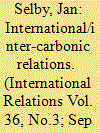

|
|
|
|
|
| Summary/Abstract |
If international relations can be theorised as ‘inter-textual’, then why not also – or indeed better – as ‘inter-carbonic’? For, not only is the modern history of carbon to a large degree international; in addition, many of the key historical junctures and defining features of modern international politics are grounded in carbon or, more precisely, in the various socio-ecological practices and processes through which carbon has been exploited and deposited, mobilised and represented, recycled and transformed. In what follows I seek to make this case, arguing that carbon and international relations have been mutually constitutive ever since the dawn of modernity in 1492, and that they will inevitably remain so well into the future, as the global economy’s dependence on fossil carbon continues unabated and the planet inexorably warms. Will climate change generate widespread conflict, or even civilisational collapse? How are contemporary power dynamics limiting responses to climate change? And how, conversely, might 21st-century world order be transformed by processes of decarbonisation? Building on research in political ecology, I argue that a dialectical sensitivity to ‘inter-carbonic relations’ is required to properly answer these questions. Scholars and students of International Relations (IR), I suggest, need to approach climate change by positioning the element C at the very centre of their analyses.
|
|
|
|
|
|
|
|
|
|
|
|
|
|
|
|
| 15 |
ID:
110043
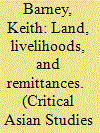

|
|
|
|
|
| Publication |
2012.
|
| Summary/Abstract |
This article seeks to draw connections between a political ecology of global investment in resource sector development and a culturally informed understanding of rural out-migration across the Lao-Thai border. The author highlights how the departures of rural youth for wage labor in Thailand and the remittances they return to sending villages are becoming important for understanding agrarian transformations in Laos today. In the first section the author introduces the contemporary context of cross-border migrations across the Lao-Thai Mekong border. The second section shifts focus to a village in Laos's central Khammouane Province, where extended field research was conducted between 2006 and 2009. In this village, youth out-migration to Thailand has become a widespread phenomenon, with nearly every household involved. The segmented cultural and gendered features of this migration and its salience for understanding contemporary transformations in this locale invite a broadening of agrarian studies analysis. The final section expands upon how political ecology can provide such a broader analysis by drawing attention to how extractive resource projects affect local tenure rights and livelihoods, with significant rents captured by the state and resource firms. By making these connections, the author argues there are coercive underpinnings to contemporary Mekong migrations, which may be linked to governance problems in the Lao resource sector.
|
|
|
|
|
|
|
|
|
|
|
|
|
|
|
|
| 16 |
ID:
153215
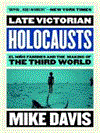

|
|
|
|
|
| Publication |
London, VERSO, 2017.
|
| Description |
x, 469p.pbk
|
| Standard Number |
9781784786625
|
|
|
|
|
|
|
|
|
|
|
|
Copies: C:1/I:0,R:0,Q:0
Circulation
| Accession# | Call# | Current Location | Status | Policy | Location |
| 059111 | 363.809172/DAV 059111 | Main | On Shelf | General | |
|
|
|
|
| 17 |
ID:
103736


|
|
|
|
|
| Publication |
2011.
|
| Summary/Abstract |
This paper presents a political ecology approach to the study of borders through consideration of a lemon's travels in contemporary North American border space. Following discussion of recent work on the dynamic, multi-scalar, and process-based character of modern borders, I suggest that such critical approaches could be usefully augmented by drawing on ideas about socio-material networks advanced by Bruno Latour. By adopting a political ecology framework, border scholars would be able to consider more fully the materiality of borders and bordering processes. Through the example of the lemon, I demonstrate that in constructing the fruit as a particular socio-material artifact that embodies multiple threats to US national space, it and its carrier become implicated in the regulation of political-economic and geopolitical networks that are seemingly far removed from the object of concern.
|
|
|
|
|
|
|
|
|
|
|
|
|
|
|
|
| 18 |
ID:
051167
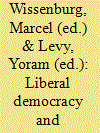

|
|
|
|
|
| Publication |
London, Routledge, 2004.
|
| Description |
xii, 219p.
|
| Standard Number |
0415321956
|
|
|
|
|
|
|
|
|
|
|
|
Copies: C:1/I:0,R:0,Q:0
Circulation
| Accession# | Call# | Current Location | Status | Policy | Location |
| 048216 | 304.2/WIS 048216 | Main | On Shelf | General | |
|
|
|
|
| 19 |
ID:
093476
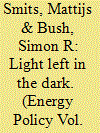

|
|
|
|
|
| Publication |
2010.
|
| Summary/Abstract |
The article describes the widespread use of an estimated 60,000 low-head pico-hydropower turbines and well-developed networks of supply and support in the Northern part of the Lao People's Democratic Republic (Lao PDR). This apparent widespread use is contrasted with the policy narratives of key actors in the government, multilateral organisations and the private sector which show an often simplified and overly negative attitude towards pico-hydropower. Based on empirical research carried out in three upland districts and the capital, Vientiane, the paper critically investigates the apparent disjuncture between policy and practice by placing pico-hydropower within the broader political context of rural electrification in the Lao PDR. It is argued that the neglect of pico-hydropower and other off-grid household electrification technologies is a result of an endemic lack of information on which to base policy decisions, the orientation of the government to facilitate large scale foreign investment in large hydropower dams, the universal applicability of solar home systems, and the broader state agenda of centralisation and control over service provision to remote upland areas.
|
|
|
|
|
|
|
|
|
|
|
|
|
|
|
|
| 20 |
ID:
121783
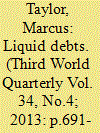

|
|
|
|
|
| Publication |
2013.
|
| Summary/Abstract |
This paper uses an approach grounded in political ecology and political economy to explain the social and ecological foundations of groundwater overexploitation and agrarian distress within semi-arid Andhra Pradesh It emphasises how relations of credit/debt have become intertwined with the tenuous social and ecological foundations of smallholder production to create a new dynamic of vulnerability across the agrarian environment. It thereby links cycles of groundwater depletion to the debt-driven survival strategies of India's small and marginal farmers within a context of dramatic changes in Indian agrarian social relations over the past three decades. In so doing, it critiques established perspectives that portray the trend towards acute groundwater overexploitation as stemming from inadequate regulation or information deficits among rural producers. Ultimately it argues that groundwater overexploitation represents a common tragedy of debt-driven livelihoods within an austere agrarian environment.
|
|
|
|
|
|
|
|
|
|
|
|
|
|
|
|
|
|
|
|
|